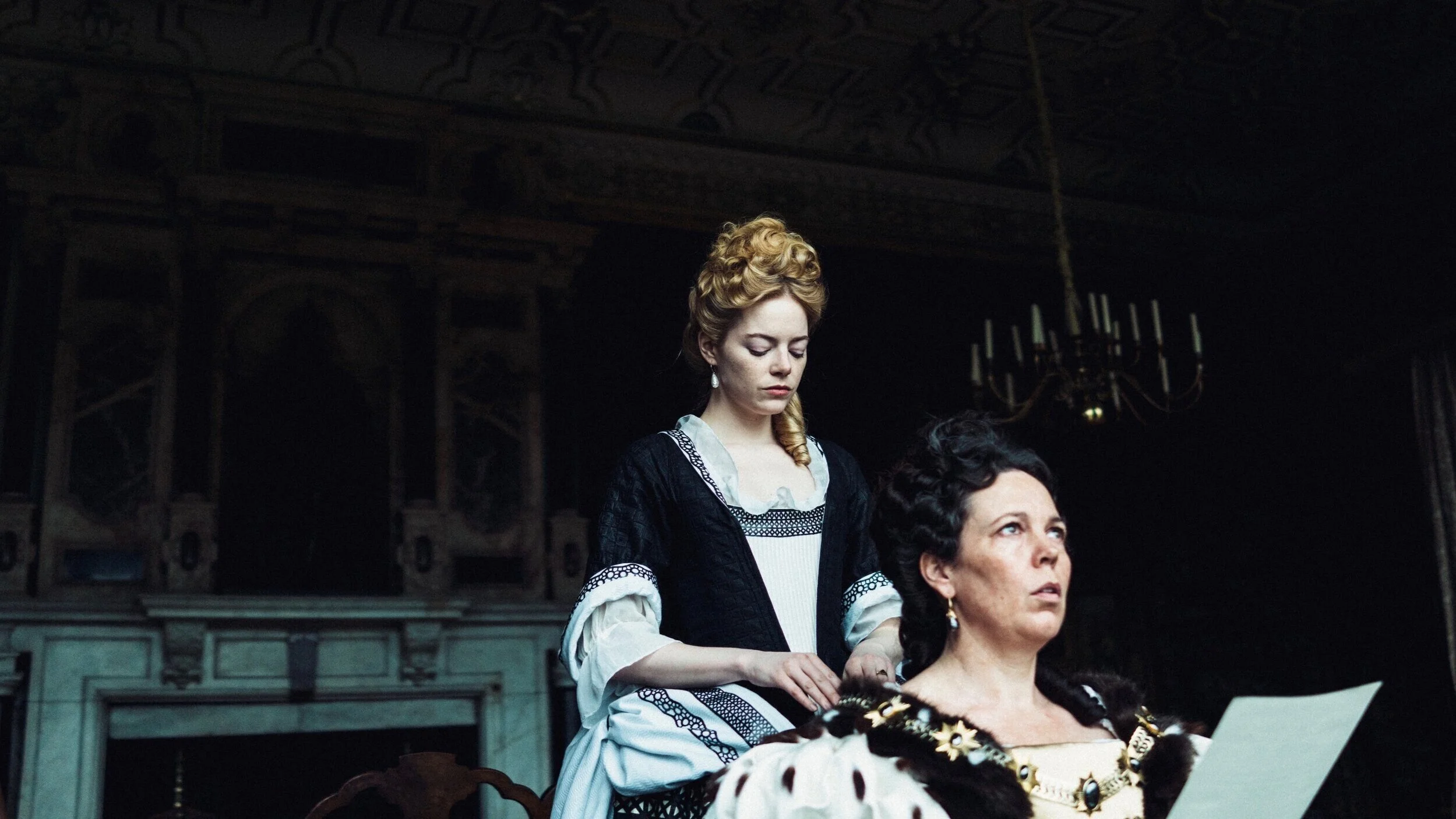The Favourite
Yorgos Lanthimos' third English-language film is a bold, fresh, original, witty and brilliant exposé of the machinations of the court of Queen Anne.
Emma Stone and Olivia Colman
The Favourite is an astonishing success story. Both for its central protagonist, Abigail Hill, and for its director. A dark talent from the Hellenic peninsula, Yorgos Lanthimos tantalized the festival circuit with his disturbing, off-centre features Dogtooth (2009) and Alps (2011), before sharpening his directorial teeth on the English-language The Lobster (2015) and The Killing of a Sacred Deer (2017). Here, he has taken on the Establishment, at least the court of Stuart England, and has come away with a carriage-full of well-deserved prizes. Yet, in spite of the Oscar glow surrounding his movie, Lanthimos has not sacrificed his edge, but has actually honed it to within an atom of its life.
Conversely, Emma Stone, the recent Oscar winner and commercial queen of Hollywood (she was Forbes' highest-paid actress of 2017), has jumped into the dark recesses of Lanthimos’ world with her sparkling eyes wide open. Besides the physical punishment she receives, the equally punishing corsets and all sorts of sexual shenanigans, she takes on an English accent. She is, in fact, an inspired piece of casting. As an American thrust into the company of the Cambridge-educated Olivia Colman and Rachel Weisz, she is the perfect outsider in this royal court of intrigue.
Following on from Ocean’s Eight, Apostasy, Widows, Disobedience and the upcoming Mary, Queen of Scots – the latter also featuring troubled queens – The Favourite crowns a miraculous year for women on screen. But the advantage that The Favourite displays is that it succeeds on every front. From Sandy Powell’s astonishing costumes and Fiona Crombie’s exquisite production design to Deborah Davis' knife-edged dialogue (co-written with Tony McNamara), the film celebrates the female condition in all its diversity.
Abigail Hill (Stone), formerly of noble standing, fell onto hard times when her father gave her away to settle a gambling debt. She was just fifteen. Reduced to catering to the demands of “a balloon-shaped German man with a thin cock,” she landed a position in the household of Queen Anne in St Albans, where her cousin, Sarah Churchill, the Duchess of Marlborough, served as Lady of the Bedchamber and confidant to the monarch. Initially tasked with scrubbing the flagstones of the kitchen and sleeping on the floor with the other servants, Abigail’s lot would not appear to have improved. Then, after having the temerity to apply healing herbs to the queen’s gout-plagued legs, she is stripped and whipped for insubordination. However, when the pain in the queen’s legs abated, Abigail was forgiven and promoted to the role of lady-in-waiting. And she was given her own room. It was the start of a social ascendancy and friendship that was to have surprising ramifications on the royal household…
As wild and improbable as all this seems, the events are actually based on fact. Even so, Queen Anne’s own eccentricities and the whims of the court are hard to comprehend, whether it be Anne’s own predilection for hoarding rabbits in her bed chamber or the nobles lobbing pomegranates and oranges at a naked man in court.
Visually, the film’s candle-lit aura recalls the majestic pomp of Stanley Kubrick’s Barry Lyndon, while Robbie Ryan's wide-angle lenses gives the film a sense of unhinged grandeur, alongside a score of Bach, Purcell, Vivaldi and a bow dragged ominously over the strings of a single cello. One particularly masterful sequence sees Queen Anne and Abigail dance alone together in silence, save for the background report of gunfire. And while it would be enough just to sit back and ogle the sets and costumes, the human drama is all too irresistible. As Anne, Oliva Colman is at once comic, volatile, frightening and pathetic, while Rachel Weisz as her adviser and lover provides the steel that holds the whole thing together. But the film really belongs to Emma Stone who, in spite of having the title role, was nominated in the supporting category at the Golden Globes. It’s a brave move for the actress, but she pulls off her litany of indignities – and English accent – with seductive self-possession.
Quite what Yorgos Lanthimos will pull off next is an exciting prospect. But this outsider’s look at the scheming, living, breathing, farting human beings behind the majestic oil paintings of the royal court will ensure his stature on the world stage.
JAMES CAMERON-WILSON
Cast: Olivia Colman, Emma Stone, Rachel Weisz, Nicholas Hoult, Joe Alwyn, Mark Gatiss, James Smith, Emma Delves, Faye Daveney, Callum Lewin.
Dir Yorgos Lanthimos, Pro Ceci Dempsey, Ed Guiney, Lee Magiday and Yorgos Lanthimos, Screenplay Deborah Davis and Tony McNamara, Ph Robbie Ryan, Pro Des Fiona Crombie, Ed Yorgos Mavropsaridis, Costumes Sandy Powell.
Scarlet Films/Element Pictures/Arcana/Film4 Productions/Waypoint Entertainment-20th Century Fox
119 mins. UK/Ireland/USA. 2018. Rel: 1 January 2019. Cert. 15.


